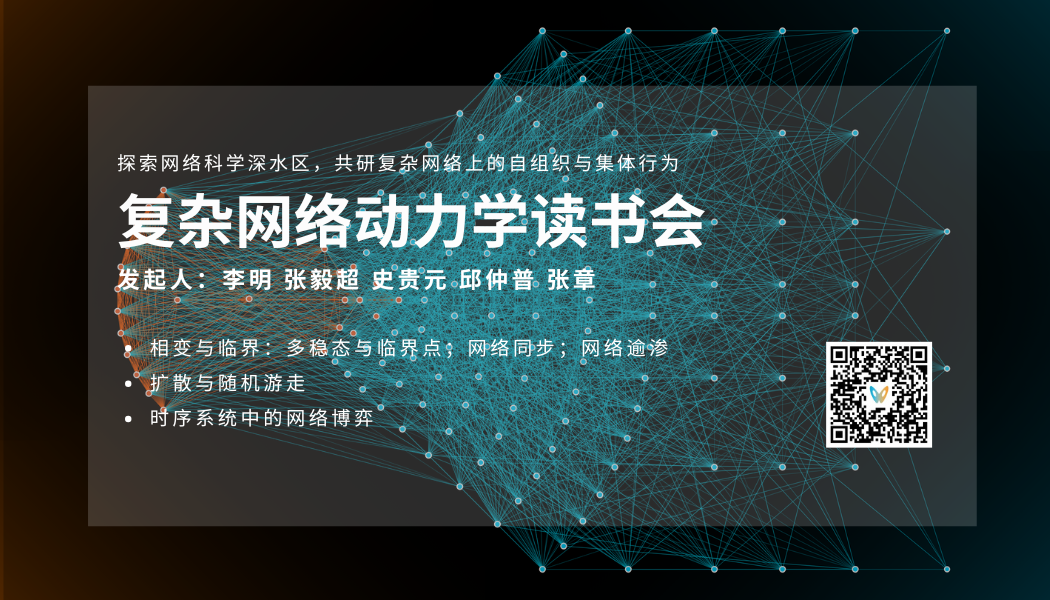集智俱乐部 集智俱乐部 2025年03月10日 18:30

导语


分享内容简介
分享内容简介
分享内容大纲
分享内容大纲
Part 1:张毅超-网络博弈的概念与发展
经典博弈
演化动态
网络中的博弈
局部纳什均衡
劣势个体
时序博弈
Part 2:张毅超、荣智海-分组研讨
复杂组织管理中时序博弈的启示与应用
时序博弈视角下的多主体建模
区块链与开源场景下的网络博弈
主要涉及到的知识概念
主要涉及到的知识概念
群体博弈,Group Game
演化博弈,Evolutionary game
时序网络博弈,Temporal-network game
有限协作时间,Finite collaboration time
讲者介绍
讲者介绍

对话嘉宾介绍
对话嘉宾介绍

参考文献
参考文献
· M. A. Nowak and R. M. May, “Evolutionary games and spatial chaos,” Nature, vol. 359, pp. 826–829, 1992.
推荐理由:构建了网络博弈框架,首次提出网络结构会对个体间合作产生显著的影响。
· G. Szabo and G. Fáth, “Evolutionary games on graphs,” Phys. Rep., vol. 446, pp. 97–216, 2007.
推荐理由:系统地从动力学、网络结构、博弈种类等多个角度介绍网络博弈的相关基础。
· D. G. Rand, S. Arbesman, and N. A. Christakis, “Dynamic social networks promote cooperation in experiments with humans,” Proc. Nat. Acad. Sci. USA, vol. 108, pp. 19193–19198, 2011.
推荐理由:设计了实证实验,证明了网络的高动态性可以显著提高人类群体合作水平。
· W. Press and F. Dyson, “Iterated prisoner’s dilemma contains strategies that dominate any evolutionary opponent,” Proc. Nat. Acad. Sci. USA, vol. 109, pp. 10409–10413, 2012.
推荐理由:2010年以后,重复2*2博弈理论研究的代表性成果,证明了基于特定策略博弈一方可以限制另一方的收益。
· Y. Zhang, G. Chen, J. Guan, Z. Zhang, S. Zhou, “Unfavorable individuals in social gaming networks,” Scientific Reports, vol. 5, p. 17481, 2015.
推荐理由:构建了分治博弈框架,分析个体的度对其博弈收益波动范围的影响。
· C. Shen, C. Chu, L. Shi, M. Perc, and Z. Wang, “Aspiration-based coevolution of link weight promotes cooperation in the spatial prisoner’s dilemma game,” Roy. Soc. Open Sci., vol. 5, 2018, Art. no. 180199.
推荐理由:构建了边权与博弈共演化的系统,揭示收益预期对于群体合作水平演化的影响。
· D. Melamed, A. Harrell, and B. Simpson, “Cooperation, clustering, and assortative mixing in dynamic networks,” Proc. Natl. Acad. Sci. U.S.A., vol. 115, no. 5, pp. 951–956, Jan. 2018.
推荐理由:揭示初始拓扑结构是否具有较高的群聚性对于动态网络中的合作水平没有影响,但对静态网络合作水平的影响显著。此外,声誉会影响合作伙伴的选择但不影响合作水平。分治或统一决策对于动态网络中合作水平的影响不大,但对静态网络合作水平的影响显著。
· M. Perc, J. J. Jordan, D. G. Rand, Z. Wang, S. Boccaletti, A. Szolnoki, “Statistical physics of human cooperation,” Physics Reports, vol. 687, pp. 1-51, 2017.
推荐理由:从方法论的层面介绍研究人类合作的各种统计物理方法。
· Y. Zhang, G. Wen, G. Chen, J. Wang, M. Xiong, J. Guan, and S. Zhou, “Gaming temporal networks,” IEEE Transactions on Circuits and Systems II: Express Briefs, vol. 66, no. 4, pp. 672–676, 2018.
推荐理由:在分治博弈的框架下揭示人类协作阵发性源于理性互动,从时间的角度重新认识分治博弈的动力学特征。
· Y. Zhang, J. Wang, G. Wen, J. Guan, S. Zhou, G. Chen, K. Chatterjee, and M. Perc, “Limitation of Time Promotes Cooperation in Structured Collaboration Systems,” IEEE Transactions on Network Science and Engineering, vol. 12, no. 1, pp. 4-12, 2025.
报名参与读书会
报名参与读书会

运行模式
报名方式
扫码填写报名信息。

复杂网络动力学读书会




内容中包含的图片若涉及版权问题,请及时与我们联系删除




评论
沙发等你来抢